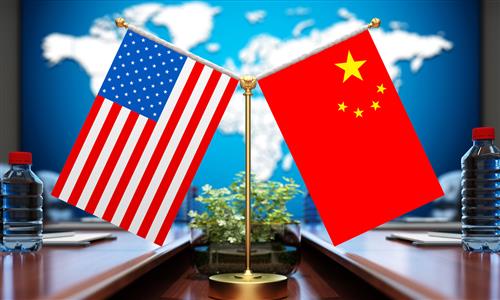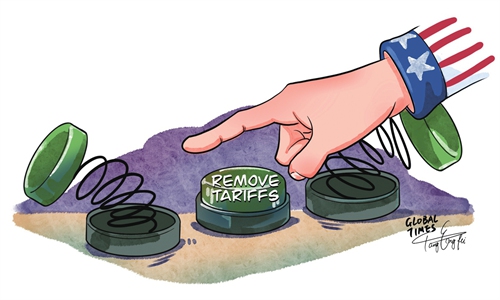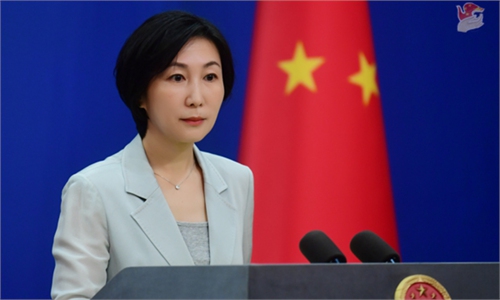GT Voice: Potential US green trade war against China will harm its own economy, consumption

Illustration: Chen Xia/Global Times
It is worrying to think of the possibility that Washington may fight a green trade war with China, which will not only hit the green economy and green consumption in the US, but also harm the development of global green economy.US Treasury Secretary Janet Yellen wrapped up her latest visit to China on Tuesday. Since the visit was a significant move aimed at reinforcing economic ties between China and the US, observers are seeking clues as to the future development of the bilateral economic relationship from Yellen's comments.
While Yellen again explicitly stated that the US does not seek to decouple from China, the tough message she conveyed during the visit inevitably raised global concerns over a potential green trade war.
For instance, she once again stressed the issue of overcapacity while warning on Monday that the US will not accept new industries being decimated by Chinese imports, according to media reports.
There is no denying that Yellen's visit has positive implications for improving communication between China and the US over a series of economic and trade issues. Through such high-level exchanges, the US has expressed concerns about specific issues in bilateral trade, while China has effectively communicated its own position and ideas to American officials.
This two-way communication is crucial for alleviating tension and fostering mutual understanding and trust.
However, growing global concerns, particularly among Western media outlets, about a possible green trade war between China and the US cannot be overlooked. Such concerns are not unfounded.
The harsh reality is evident: The US has imposed various kinds of economic, trade and technological containment actions against China, with an ever-growing list of sanctions against Chinese companies.
As long as these negative actions toward China continue, there's a risk that Washington's complaints about Chinese green products, such as electric vehicles (EVs), batteries and solar panels, may lead to actual trade friction.
Given the wide-ranging impact of the trade war on global supply chains, a potential green trade war is indeed concerning. Undoubtedly, the economic and trade situation between China and the US will have a far-reaching impact on the green development of the global economy. This is also why mainstream public opinion around the world still hopes for the stabilization and improvement of China-US economic relations.
On the one hand, a green trade war could lead to a restructuring of global supply chains, which could mean increased costs and decreased efficiency, ultimately weighing on the global economy.
On the other hand, trade protectionism in such a trade war may hinder the free flow of green technologies and green products worldwide, hampering global efforts to reduce emissions and constituting a drag on global climate change efforts.
It is widely acknowledged that China has achieved significant progress in developing clean energy technologies and industries, which not only drives the sustainable growth of its own economy, but also offers global solutions for a green transition.
If the US were to adopt protectionist measures in this sector, it would raise questions about its commitment to reducing global emissions. Does the US have the ability to meet its climate targets after "decoupling" from China's green products?
Moreover, US media concerns about whether there will be a repeat of trade friction in the green sector, just like the one in traditional manufacturing, between China and the US foreshadow the worrying consequences of US protectionism.
History shows that in the previous trade dispute, despite the losses that China suffered, ultimately American consumers bore the brunt of increased costs. In a green trade war, American consumers may once again bear the high costs of a green transition. After a period of elevated inflation in the US in recent years, it is highly questionable whether they will be willing to accept such costs.
In this sense, it is sincerely hoped that after Yellen's visit, the US implements its promise of "no decoupling" to effective allay the concerns about the green development of the global economy.



